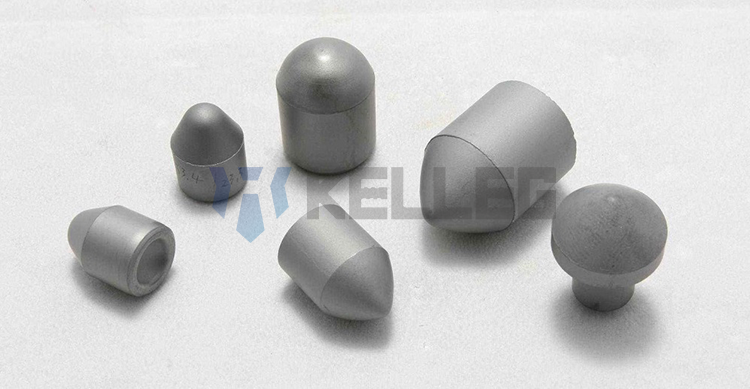2020 官网升级中!现在您访问官网的浏览器设备分辨率宽度低于1280px请使用高分辨率宽度访问。
The emergence of cemented carbide has made epoch-making changes in rock drilling tools. Its main features are high hardness, good wear resistance, definite strength, and heat resistance. However, it is also a quasi-brittle material that is very sensitive to surface cracks or defects and has poor resistance to shock and heat. Its compressive strength is high, but its tensile strength is low. At the same time, it is also sensitive to stress concentration. To give full play to the working potential of cemented carbide, it is necessary to understand its properties.

1. Density
The density of cemented carbide for rock drilling is generally 14~15g/cm³. The chemical composition and grade of the alloy can be glimpsed by density measurement. Under certain conditions, the density of cemented carbide is extremely sensitive to porosity, carburization, and underburning.
2. Hardness
The hardness of cemented carbide is usually HRA86.5~91. The hardness varies with the cobalt content and the size of the tungsten carbide grains. In most applications, hardness is a key indicator of cemented carbide, and a sensitive measure of its quality. Cemented carbide has a high-temperature hardness, the hardness changes little below 500 ℃, and decreases significantly above 500 ℃. When the temperature reaches 1000℃, its hardness is only about 1/4 of the hardness at the room temperature. Therefore, the temperature is an important factor when determining the brazing and fixing process. In the case of the same cobalt content, the hardness can reflect the wear resistance of the alloy.
3. Bending strength
Bending strength is an important indicator to measure the quality of cemented carbide. The bending strength of cemented carbide is usually in the range of 1700~3600MPa. With the increase of cobalt content in the alloy, the bending strength increases but has a peak value. The bending strength is also related to the size of carbide grains. The bending strength of coarse-grained alloys is generally higher than that of fine-grained alloys. When a certain carburized phase appears in the alloy, its bending strength decreases slightly.
4. Impact toughness
The impact toughness of cemented carbide mainly depends on cobalt content, impurity content, substructure and size of tungsten carbide grains, cobalt layer thickness, and cobalt phase properties.
5. Compressive strength
The compressive strength of cemented carbide is generally 3500~7000MPa, which is very high in today’s composite materials. Its value is related to the level of cobalt content and the size of carbide grains.
6. Linear expansion coefficient
The linear expansion coefficient of cemented carbide is relatively small, and its value increases with the increase of cobalt content in the alloy. The linear expansion coefficient of cemented carbide, drill bit shell steel, and solder varies greatly when heated.
7. Abrasive resistance
The abrasive resistance of cemented carbide is 15 to 20 times higher than the hardest high-speed steel. There are many factors affecting the abrasive resistance of cemented carbide, which are mainly related to the composition, structure, and hardness of the alloy. When the cobalt content is constant, the abrasive resistance of the fine-grained alloy is high. When the WC grain size is the same, the abrasive resistance of the low cobalt content is high.
8. Coercive force
The tungsten carbide in the cemented carbide is non-magnetic, but the cobalt in it is a ferromagnetic metal, so the alloy has some magnetic properties.
9. Corrosion resistance
Acid and alkali have corrosive effects on tungsten and cobalt carbide. The acid mainly corrodes the cobalt phase, while the alkali corrodes the hard tungsten carbide and its grain boundaries. The surface of the corroded alloy has a large number of voids, which reduces its fatigue strength. Therefore, it is not appropriate to use pickling and alkali boiling methods when cleaning oxides on the surface of the alloy before brazing.
10. Oxidation resistance
When heated in air below 700℃, the oxidation of cemented carbide is not serious. However, when heated to above 800 ℃, violent oxidation will occur. A layer of loose oxide is formed on the surface of the alloy, resulting in oxidation loss.
Understanding the properties of cemented carbide is to better play its value. With the development of rock drilling technology, modern drilling conditions have higher and higher requirements for the strength, toughness, and wear resistance of cemented carbide to resist fracture and fatigue fracture. Combined with the exploration of cemented carbide properties, we can maximize the value of cemented carbide and make great contribution to the field of rock drilling.